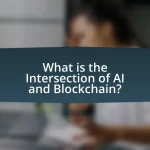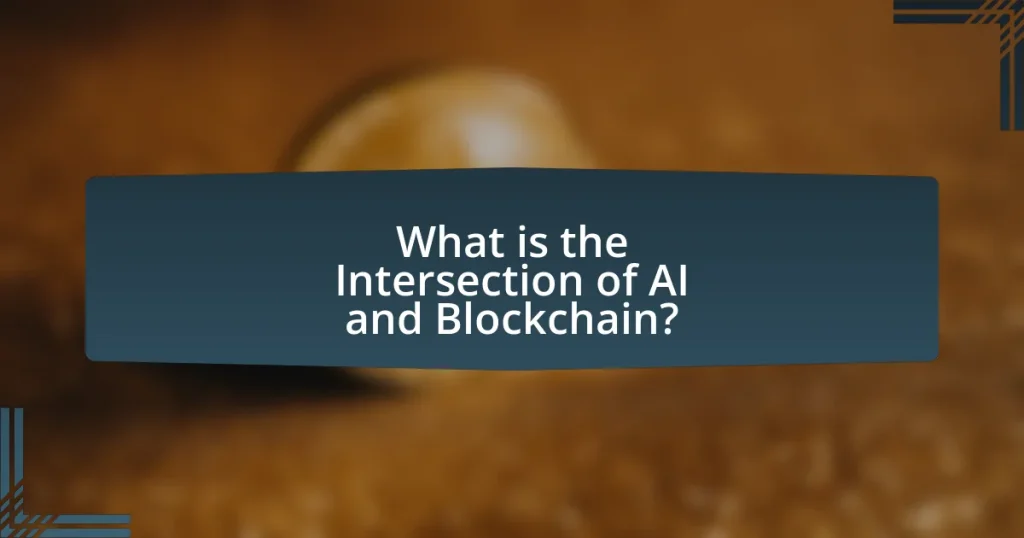The article explores the intersection of artificial intelligence (AI) and blockchain technology, highlighting their integration to enhance data security, transparency, and operational efficiency. It discusses how AI can analyze blockchain data for improved decision-making, while blockchain provides a secure ledger for AI-generated data, fostering trust and accountability. Key features of AI that enhance blockchain applications, potential market implications, and the challenges of merging these technologies are examined. Additionally, the article addresses ethical considerations, investment trends, and best practices for businesses looking to leverage the synergy between AI and blockchain.

What is the Intersection of AI and Blockchain?
The intersection of AI and blockchain refers to the integration of artificial intelligence technologies with blockchain systems to enhance data security, transparency, and efficiency. AI can analyze vast amounts of data stored on blockchain networks, enabling smarter decision-making and predictive analytics, while blockchain provides a secure and immutable ledger for AI-generated data, ensuring trust and accountability. For instance, a study by Accenture found that combining AI with blockchain could increase the global economy by $3 trillion by 2030, highlighting the significant market implications of this convergence.
How do AI and Blockchain technologies complement each other?
AI and Blockchain technologies complement each other by enhancing data security and improving decision-making processes. Blockchain provides a decentralized and immutable ledger that ensures data integrity, which is crucial for AI systems that rely on accurate data for training and predictions. For instance, AI can analyze data stored on a blockchain to derive insights while benefiting from the trustworthiness of that data. Additionally, AI can optimize blockchain operations, such as improving transaction speeds and automating smart contracts through machine learning algorithms. This synergy not only increases efficiency but also fosters innovation across various sectors, including finance and supply chain management.
What are the key features of AI that enhance Blockchain applications?
AI enhances blockchain applications primarily through improved data analysis, automation, and security. Enhanced data analysis allows AI algorithms to process and interpret vast amounts of blockchain data, identifying patterns and insights that can inform decision-making. Automation features enable smart contracts to execute transactions automatically based on predefined conditions, reducing the need for intermediaries and increasing efficiency. Additionally, AI contributes to security by employing machine learning techniques to detect anomalies and potential fraud within blockchain networks, thereby strengthening trust and reliability. These features collectively optimize blockchain functionality and drive innovation in various sectors.
How does Blockchain improve the security and transparency of AI systems?
Blockchain enhances the security and transparency of AI systems by providing a decentralized and immutable ledger for data transactions. This technology ensures that all interactions and data used by AI models are recorded in a way that is tamper-proof, making it difficult for malicious actors to alter the data or the outcomes generated by AI systems. For instance, the use of smart contracts on blockchain can automate and verify transactions without the need for intermediaries, thereby reducing the risk of fraud. Additionally, the transparency of blockchain allows stakeholders to audit AI processes and data sources, ensuring accountability and trust in AI decision-making. This combination of security and transparency is crucial in sectors like finance and healthcare, where data integrity is paramount.
What are the potential market implications of combining AI and Blockchain?
Combining AI and Blockchain can lead to significant market implications, including enhanced data security, improved efficiency in transactions, and the creation of new business models. The integration of AI algorithms with Blockchain technology allows for secure data sharing and analysis, which can reduce fraud and increase trust among participants in various industries. For instance, a report by Deloitte highlights that the combination can streamline supply chain processes, enabling real-time tracking and verification of goods, thereby reducing costs and improving transparency. Additionally, the use of smart contracts powered by AI can automate complex processes, further driving efficiency and innovation in sectors such as finance, healthcare, and logistics.
How can the integration of AI and Blockchain disrupt traditional industries?
The integration of AI and Blockchain can disrupt traditional industries by enhancing efficiency, transparency, and security in operations. AI algorithms can analyze vast amounts of data in real-time, enabling businesses to make informed decisions quickly, while Blockchain provides a decentralized ledger that ensures data integrity and traceability. For instance, in supply chain management, AI can optimize logistics and inventory management, while Blockchain can track the provenance of goods, reducing fraud and errors. According to a report by McKinsey, companies that adopt AI and Blockchain technologies can achieve up to a 30% reduction in operational costs, demonstrating the significant impact these technologies can have on traditional business models.
What new business models could emerge from this intersection?
New business models that could emerge from the intersection of AI and blockchain include decentralized autonomous organizations (DAOs) that leverage AI for decision-making and resource allocation. These DAOs can operate without centralized control, using smart contracts on blockchain to automate processes, thereby increasing efficiency and transparency. Additionally, AI-driven predictive analytics can enhance supply chain management by utilizing blockchain for secure data sharing, leading to improved inventory management and reduced costs. The integration of AI in blockchain can also facilitate personalized financial services through automated, data-driven insights, allowing for tailored investment strategies based on real-time market analysis.

What are the Challenges in Merging AI and Blockchain?
The challenges in merging AI and blockchain include scalability, data privacy, and integration complexity. Scalability issues arise because blockchain networks often struggle to handle the high transaction volumes required by AI applications, which can lead to delays and inefficiencies. Data privacy concerns are significant, as AI systems typically require access to large datasets, while blockchain’s transparency can conflict with the need to keep sensitive information confidential. Integration complexity is another challenge, as combining these two technologies requires specialized knowledge and can involve significant technical hurdles, making it difficult for organizations to implement effective solutions.
What technical hurdles must be overcome for successful integration?
Successful integration of AI and blockchain requires overcoming several technical hurdles, including interoperability, data privacy, and scalability. Interoperability challenges arise from the need for different blockchain platforms and AI systems to communicate effectively, which often involves standardizing protocols and data formats. Data privacy concerns must be addressed to ensure that sensitive information processed by AI remains secure on blockchain networks, necessitating the development of privacy-preserving techniques. Scalability issues are critical as both AI and blockchain technologies can face performance bottlenecks; thus, solutions such as off-chain processing and layer-2 scaling solutions are essential to handle increased transaction volumes and computational demands.
How do scalability issues affect the performance of AI and Blockchain together?
Scalability issues significantly hinder the performance of AI and Blockchain when integrated. Both technologies require substantial computational resources and data throughput; however, Blockchain’s inherent limitations in transaction speed and capacity can bottleneck AI’s data processing capabilities. For instance, Ethereum, a widely used Blockchain platform, can handle only about 30 transactions per second, which is insufficient for AI applications that demand real-time data analysis and decision-making. This mismatch leads to delays and inefficiencies, ultimately affecting the overall effectiveness of AI solutions that rely on Blockchain for secure data storage and verification.
What are the regulatory challenges facing AI and Blockchain convergence?
The regulatory challenges facing AI and Blockchain convergence include issues related to data privacy, compliance with existing financial regulations, and the need for clear legal frameworks. Data privacy concerns arise because AI systems often require large datasets, which may include personal information, while blockchain technology emphasizes transparency and immutability. Compliance with financial regulations is complicated by the decentralized nature of blockchain, which can conflict with traditional regulatory frameworks designed for centralized entities. Additionally, the lack of clear legal definitions and standards for AI and blockchain technologies creates uncertainty for businesses and regulators alike, hindering innovation and adoption.
What ethical considerations arise from the intersection of AI and Blockchain?
The ethical considerations arising from the intersection of AI and Blockchain include data privacy, accountability, and bias. Data privacy concerns emerge because AI systems often require large datasets, which may include sensitive information stored on blockchain networks. Accountability issues arise as the decentralized nature of blockchain complicates the attribution of responsibility for AI decisions, making it difficult to hold entities accountable for harmful outcomes. Additionally, bias in AI algorithms can be exacerbated by the data used in blockchain, leading to unfair treatment of certain groups. These considerations highlight the need for ethical frameworks that address the implications of combining these technologies.
How can bias in AI algorithms impact Blockchain applications?
Bias in AI algorithms can lead to skewed data inputs in Blockchain applications, resulting in unfair or inaccurate outcomes. For instance, if an AI model trained on biased data is used to validate transactions or assess creditworthiness, it may favor certain demographics over others, undermining the principle of decentralization and fairness inherent in Blockchain technology. This can manifest in discriminatory practices, such as unequal access to services or resources, which contradicts the foundational goals of Blockchain to promote transparency and equality. Studies have shown that biased AI can perpetuate existing inequalities, highlighting the need for rigorous data governance and ethical AI practices in Blockchain implementations.
What measures can be taken to ensure ethical use of AI and Blockchain technologies?
To ensure the ethical use of AI and Blockchain technologies, organizations should implement robust governance frameworks that include transparency, accountability, and fairness. Transparency can be achieved by making algorithms and data sources accessible for scrutiny, allowing stakeholders to understand how decisions are made. Accountability involves establishing clear lines of responsibility for AI and Blockchain applications, ensuring that developers and users are held responsible for their impacts. Fairness can be promoted by actively identifying and mitigating biases in AI algorithms and ensuring equitable access to Blockchain benefits. Research indicates that ethical guidelines, such as those proposed by the IEEE and the European Commission, emphasize these principles as essential for fostering trust and integrity in technology deployment.

How is the Market Responding to AI and Blockchain Integration?
The market is responding positively to the integration of AI and blockchain, evidenced by increased investments and the emergence of innovative applications. According to a report by MarketsandMarkets, the global AI in blockchain market is projected to grow from $0.2 billion in 2020 to $1.4 billion by 2025, reflecting a compound annual growth rate (CAGR) of 47.2%. This growth is driven by the demand for enhanced security, transparency, and efficiency in transactions, as AI algorithms improve data analysis and decision-making processes within blockchain networks. Additionally, companies across various sectors, including finance and supply chain management, are actively exploring AI and blockchain solutions to optimize operations and reduce costs, further indicating a strong market response.
What industries are leading the adoption of AI and Blockchain technologies?
The industries leading the adoption of AI and Blockchain technologies are finance, healthcare, supply chain management, and retail. In finance, AI enhances fraud detection and risk management, while Blockchain improves transaction security and transparency. Healthcare utilizes AI for diagnostics and patient care optimization, with Blockchain ensuring secure patient data sharing. Supply chain management benefits from AI in demand forecasting and Blockchain in tracking product provenance. Retail employs AI for personalized marketing and inventory management, with Blockchain facilitating secure transactions and customer data protection. These industries demonstrate significant investment and innovation in integrating both technologies to enhance operational efficiency and security.
How are financial services leveraging AI and Blockchain for innovation?
Financial services are leveraging AI and Blockchain for innovation by enhancing operational efficiency, improving customer experiences, and increasing security. AI algorithms analyze vast amounts of data to identify patterns, enabling personalized financial products and fraud detection, while Blockchain technology provides a secure, transparent ledger for transactions, reducing the risk of fraud and errors. For instance, according to a report by McKinsey, financial institutions that adopt AI can improve their productivity by up to 40%, and Blockchain can streamline processes such as cross-border payments, reducing transaction times from days to minutes.
What role does healthcare play in the adoption of these technologies?
Healthcare plays a crucial role in the adoption of AI and blockchain technologies by driving demand for innovative solutions that enhance patient care and operational efficiency. The healthcare sector increasingly seeks to leverage AI for predictive analytics, personalized medicine, and improved diagnostics, while blockchain offers secure data sharing and interoperability among healthcare providers. According to a report by Accenture, AI applications in healthcare could create $150 billion in annual savings by 2026, highlighting the financial incentive for adoption. Furthermore, the integration of blockchain can address issues of data integrity and patient privacy, which are paramount in healthcare, thereby facilitating trust and compliance with regulations.
What are the investment trends in AI and Blockchain sectors?
Investment trends in the AI and Blockchain sectors indicate a significant increase in funding and interest, with AI attracting over $100 billion in investments in 2023 alone, driven by advancements in machine learning and automation. Concurrently, the Blockchain sector has seen a resurgence, with venture capital investments exceeding $30 billion, largely fueled by the growing adoption of decentralized finance (DeFi) and non-fungible tokens (NFTs). These trends reflect a convergence where AI enhances Blockchain applications, improving efficiency and security, while Blockchain provides transparency and trust in AI systems.
How are venture capitalists viewing the potential of AI and Blockchain?
Venture capitalists are increasingly optimistic about the potential of AI and Blockchain, viewing them as transformative technologies that can drive significant market growth. This optimism is supported by substantial investments; for instance, in 2021, AI startups attracted over $66 billion in funding, while blockchain-related investments reached approximately $30 billion. These figures indicate a strong belief in the ability of these technologies to innovate industries, enhance operational efficiencies, and create new business models. Additionally, venture capitalists recognize the synergy between AI and Blockchain, as AI can enhance data security and decision-making processes within blockchain systems, further amplifying their market potential.
What are the key indicators of market growth in these technologies?
Key indicators of market growth in AI and blockchain technologies include increasing investment levels, rising adoption rates across industries, and the emergence of regulatory frameworks. For instance, global investment in AI is projected to reach $500 billion by 2024, reflecting a compound annual growth rate (CAGR) of 20.1% from 2020. Similarly, the blockchain market is expected to grow from $3 billion in 2020 to over $39 billion by 2025, indicating a CAGR of 67.3%. Additionally, the integration of AI and blockchain in sectors such as finance, healthcare, and supply chain management demonstrates a growing trend, with companies increasingly leveraging these technologies to enhance efficiency and security.
What best practices should businesses follow when integrating AI and Blockchain?
Businesses should prioritize data security, interoperability, and ethical considerations when integrating AI and Blockchain. Data security is essential as both technologies handle sensitive information; implementing robust encryption and access controls can mitigate risks. Interoperability between AI systems and Blockchain networks ensures seamless data exchange, which can enhance operational efficiency. Ethical considerations, including transparency and accountability in AI algorithms and Blockchain transactions, are crucial to build trust with stakeholders. According to a report by Deloitte, organizations that adopt these best practices are more likely to achieve successful integration and realize the full potential of both technologies.










